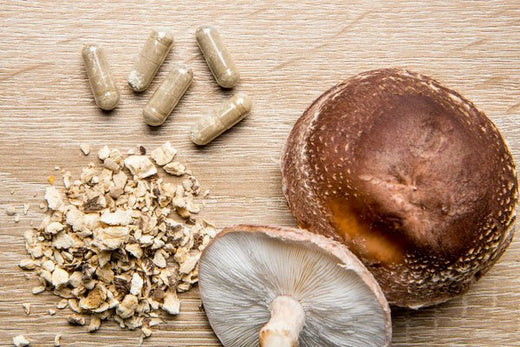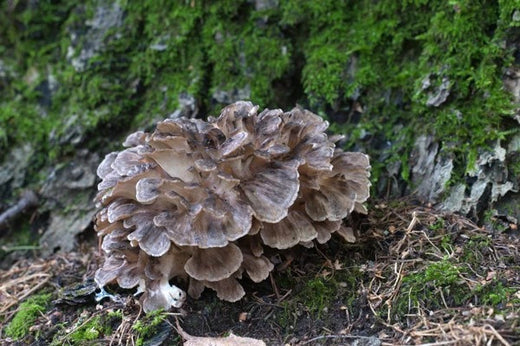Unravelling the A to Z Secrets of Probiotics

Probiotics: A Simple Guide
Probiotics are friendly bacteria, often referred to as "good bacteria," that play a vital role in maintaining our overall health. In simple terms, probiotics are living microorganisms that offer numerous benefits by promoting diversity, balance, and functionality within our body's microbiomes.
Our digestive tract is home to trillions of these beneficial microorganisms, outnumbering our own cells tenfold. To put it in perspective, the number of microbes in our guts surpasses the stars in the universe! While we commonly associate probiotics with gut health, they also impact our oral and vaginal microbiomes (specifically in women).
These biomes house a vast array of bacteria, fungi, parasites, mites, and viruses. When the right balance of these microorganisms is maintained, they contribute to our overall well-being and proper bodily functions.
Scientific research has shown that incorporating probiotics into our routine can greatly benefit our gut health and overall wellness. However, due to insufficient nutrients in our diets, the average person may not be getting enough probiotics naturally. That's why supplementing with organic probiotics is a wise choice.
Probiotic products come in various forms, such as pills, powders, and liquids, and can also be found naturally in fermented foods. However, it's important to note that not all probiotics are of equal quality. Regrettably, the market is flooded with subpar probiotic products. It's crucial to understand which probiotic supplements or foods are best suited for your needs.
In this article, we will delve into the advantages of probiotics, their mechanisms of action, and their specific benefits for both men and women. We will also explore the differences between probiotic supplements and food-based organic probiotics, providing you with valuable insights to make informed choices for your well-being.
Table of Contents
-
The Mechanics of Probiotics
-
The Remarkable Ways Probiotics Promote Health
-
Top Food Sources for Natural Probiotics
-
Lab-Grown Probiotics vs. Natural Wild Fermentation
-
The Quality of Probiotics Varies Widely
-
To what extent do probiotics help males?
-
Gut Health and Digestion
-
Sexual Health and Reproductive Function
-
Immunity
-
Cognitive Health
-
Heart Health
-
For females, what are the advantages of taking probiotics?
-
Gut Health and Digestion
-
Probiotics For Vaginal Health
-
Probiotics for Hormone Health
-
Probiotics for Mood
-
Probiotics for Immunity
-
Probiotics for Skin Health
-
Probiotics for Sleep
-
Probiotics for Weight Loss
-
Does it Make a Difference If I Take Probiotic Supplements?
-
Prebiotics and probiotics: why they go hand in hand.
-
Is It Safe to Take Probiotics?
-
Probiotic Mushrooms, Safe for Both Sexes
-
Conclusion
-
References

The Mechanics of Probiotics
Understanding how probiotics work involves two crucial aspects. Firstly, certain probiotics are transient, meaning they pass through the gastrointestinal tract, interact with existing microorganisms, and alleviate symptoms. However, they don't permanently establish themselves in the gut.
On the other hand, some probiotics colonize the gastrointestinal tract. Once they navigate their way from the mouth to the intestines, they take up residence and positively influence the bacterial diversity within the gut's microbiome.
To simplify this concept, let's envision the gut as a gigantic checkerboard. Similar to a game of checkers, different colors represent various species of bacteria. Common bacterial species include Bifidobacterium, Lactobacillus, Staphylococcus, Enterococci, and Propionibacterium.
In a healthy gut, these diverse species coexist in varying proportions, preventing dysbiotic bacteria and yeasts from overgrowing and causing imbalances. The presence of these "good guys" (healthy bacteria) plays a vital role in keeping the "bad guys" (harmful bacteria) at bay. This is why we consume or take organic probiotics – they help establish a diverse array of beneficial bacteria, ensuring a well-functioning, non-leaky gut.
The purpose of probiotics is to maintain a healthy balance between good and bad bacteria. However, several factors can disrupt this balance and contribute to an unhealthy gut:
- Antibiotic use
- Food poisoning
- Medications
- Poor diet
- Stress
- Food additives, heavy metals, pesticides, and mycotoxins
- C-section birth (During a natural vaginal birth, a baby's gastrointestinal tract is exposed to beneficial bacteria from the mother's vaginal microbiome, aiding in the establishment of the baby's own microbiome.)
The above list highlights key factors that can disrupt the presence of beneficial bacteria, allowing dysbiotic bacteria to thrive and cause bacterial overgrowth, as well as other gut health issues and imbalances.

The Remarkable Ways Probiotics Promote Health
Probiotics, those beneficial bacteria residing in our gut, play a vital role in maintaining our overall well-being by regulating gut permeability (also known as leakiness) and producing short-chain fatty acids (SCFA).
When we mention probiotics, we refer to the various species of beneficial bacteria naturally present in the gut that contribute to optimal bodily functions.
The gut microbiome, which houses these beneficial bacteria, has a significant impact on regulating sex hormones, immune function, metabolism, energy levels, and even mood. Hippocrates, the Father of Modern Medicine, stated thousands of years ago that "all disease begins in the gut." This underscores the importance of nurturing a healthy gut for overall bodily health.
The beneficial bacteria, primarily falling under the Bacteroidetes phylum, including species like Lactobacillus and Bifidobacterium, produce valuable SCFA such as butyrate, propionate, and acetate. These bacteria utilize the fibre, resistant starch, and polyphenols from the plant foods we consume to create SCFA.
SCFA, in turn, serves as fuel for our intestinal cells (enterocytes and colonocytes) and supports liver cell function when released into circulation. This symbiotic relationship between gut bacteria and our own cells facilitates the assimilation of nutrients from our food and their transport into the bloodstream.
Research indicates that SCFA has several remarkable benefits, including reducing gut inflammation, improving intestinal barrier integrity, promoting healthy mucus production, lowering the risk of colorectal cancer, modulating the immune system, and even influencing the gut-brain axis and neurotransmitter production.
Probiotics also contribute to our well-being by preventing the overgrowth of harmful bacteria and dysbiosis, which can lead to leaky gut, gut inflammation, immune dysregulation, metabolic issues, gastrointestinal diseases, and discomfort.
When the gut's bacterial balance is disrupted, individuals may experience allergy symptoms, mood imbalances, low energy, fatigue, metabolic challenges, cardiovascular issues, hormonal imbalances, skin problems, accelerated aging, and autoimmune conditions.
In essence, probiotics, the healthy bacteria within us, are fundamental to supporting our overall health and well-being. It is important to consider incorporating them regularly into our routine to harness their myriad benefits.

Top Food Sources for Natural Probiotics
When it comes to natural probiotics, fermented foods take the spotlight as the best sources. These foods are brimming with live microorganisms, or healthy bacteria, known as probiotics.
Here are some of the finest gut-healthy fermented foods to incorporate into your diet:
- Yogurt
- Kefir
- Sauerkraut / Kimchi / Pickled Vegetables
- Sourdough bread
- Tempeh
- Miso
- Natto
- Kombucha
- Fermented cheeses
Lab-Grown Probiotics vs. Natural Wild Fermentation
Certain probiotic strains are generated in laboratories and then used in dietary supplements and other consumer goods. This is the common perception when we hear the term "probiotic."
Regarding lab-grown probiotics, there is a new category of probiotic supplements known as spore-based probiotics. These probiotics are encapsulated in a spore form, allowing them to survive the harsh environment of the gastrointestinal tract. Our stomach, with its highly acidic pH of 2.0, is designed to eliminate pathogens and bacteria.
Spore-based probiotics have shown the ability to colonize the gastrointestinal tract rather than just passing through like generic probiotics found on store shelves or in the refrigerator. They act as nourishment for the microbiome, enabling healthy probiotic bacteria to establish themselves.
Refrigerated probiotics undoubtedly have beneficial effects on the gut. However, they often serve as a temporary solution or can even worsen gut health in some cases.

The Quality of Probiotics Varies Widely
While commercial probiotics can sometimes alleviate gastrointestinal (GI) symptoms like bloating, gas, diarrhea, and constipation by positively influencing the gut if they survive the GI tract, not all of them are as effective as they claim.
Many commercial probiotics do not actually contain the stated colony forming units (CFU) as indicated on the label, such as 500 billion CFU, and research has shown that they may not survive the GI tract or have a significant impact on the gut.
In fact, taking commercial probiotic supplements daily can sometimes do more harm than good, as continuously introducing certain lab-grown strains can disrupt the natural balance of species within the gut. This disruption can be particularly problematic for individuals with small intestinal bacterial overgrowth (SIBO), as their symptoms may worsen with the use of commercial probiotics.
When dealing with gut issues, it is crucial to address the underlying cause and focus on using food as a healing modality. This is where natural wild fermented probiotics can play a key role.
Natural wild-fermented probiotics are considered functional foods. They are the result of a natural fermentation process that produces wild strains of probiotics that are symbiotic with our bodies. Some well-known commercial probiotic strains, such as Lactobacillus rhamnosus GG or Bifidobacterium lactis (BI-04) Bifidobacterium animalis ssp. lactis (BI-04), can be found in these wild-fermented natural probiotics.
Unlike commercial probiotics, natural wild-fermented probiotics are crafted by nature and each batch offers a diverse range of probiotic strains. These bacteria work together in colonies and communities, harnessing their collective intelligence and strength. Many probiotics on the market isolate a single bacterial strain instead of incorporating multiple strains that balance the entire system and allow the colonies to support and communicate with each other. The body thrives on "healthy and alive" bacterial colonies working harmoniously throughout its entirety.
To ensure optimal benefits, it is important to seek out probiotic supplements that contain multiple strains of bacteria. This approach allows for more comprehensive and balanced support to the body's microbiome.

To what extent do probiotics help males?
Probiotics offer a range of benefits for men's health in different areas.
Gut Health and Digestion
Probiotics help improve men's gut health and digestion, which can have positive effects on immunity, cardiovascular health, weight management, libido, and reproductive function. Many men experience GI issues like reflux, indigestion, bloating, IBS, and constipation, which are closely tied to the diversity of gut bacteria and digestive system function. Taking probiotics can help alleviate these symptoms and enhance overall quality of life.
Sexual Health and Reproductive Function
Probiotics play a role in regulating libido, sperm quality, and fertility in men. Stress is a significant factor affecting male infertility, as it can decrease sperm quality and testosterone levels. By reducing internal stress and supporting the production of beneficial substances like short-chain fatty acids (SCFA), probiotics contribute to better overall health, sexual function, and reproductive well-being.
Immunity
The gut is home to around 90% of the immune system. Regular consumption of probiotics supports a healthy and robust immune system in men. Whether it's recovering from the flu or combating the infamous "man flu," introducing beneficial bacteria and promoting the colonization of these helpful species improves immune system function and can be beneficial in managing autoimmune diseases.
Cognitive Health
The gut-brain axis, a bidirectional communication system between the gut microbes and the brain, plays a crucial role in cognitive health. The gut produces 90% of serotonin, dopamine, and 50% of noradrenaline, and contributes to the production of GABA, all of which impact cognition, thinking, memory, and mood elevation. Probiotics aid in the production of these neurotransmitters, benefiting overall cognitive health. A healthy gut also helps prevent the development of neurodegenerative diseases such as Alzheimer's and Dementia, which are closely linked to glucose imbalance and gut inflammation.
Heart Health
The gut microbiome influences cardiovascular health by playing a role in maintaining healthy cholesterol and blood sugar levels. Recent research suggests that gut bacteria can impact metabolic function through the trimethylamine N-oxide (TMAO) pathway. Elevated TMAO levels indicate an increased risk of major cardiovascular events like heart attacks and strokes. By incorporating probiotics into their routine, men can help alleviate these symptoms, improve nutrient absorption, enhance energy levels, support recovery, reduce inflammation, and maintain a healthy immune function.
It's important to note that probiotics should be accompanied by a diet rich in prebiotics. Prebiotic foods mainly come from plants, including vegetables, fruits, legumes, whole grains, nuts, and seeds. Consuming more plant-based foods ensures the survival and colonization of beneficial probiotics, leading to improvements in gut health, fertility, libido, immunity, cardiovascular function, and cognitive function.

For females, what are the advantages of taking probiotics?
Probiotics offer numerous benefits for women's health across various aspects.
Gut Health and Digestion
Similar to men, women can greatly benefit from incorporating a daily probiotic into their routine to support gut health and digestion. A healthy gut leads to a strong immune system, reduced bloating, improved elimination, increased energy levels, balanced hormone function, better mood, and reduced stress.
Probiotics For Vaginal Health
In addition to the gut microbiome, women also have a vaginal microbiome that plays a crucial role in protecting against invading pathogens. Probiotics are essential for maintaining a healthy vaginal microbiome. Factors like consuming excessive sugar and starch, using harsh pH-disrupting vaginal washes, taking medications or alcohol, and having a history of antibiotics can disrupt the vaginal microbiome. To support vaginal health, it's important to reduce refined sugars and carbohydrates, avoid chemical body washes and soaps, stay hydrated, take a daily probiotic, and consume a diet rich in prebiotic fiber, protein, fats, and antioxidants.
Probiotics for Hormone Health
Regular probiotic use helps maintain healthy hormone levels in women. The microbiome is involved in the excretion of estrogen and other sex hormones. Balanced hormone levels contribute to improved mood, energy, libido, fertility, and weight management.
Probiotics for Mood
The gut is responsible for producing 90% of serotonin, a hormone that regulates mood, appetite, and is a precursor to melatonin, the sleep hormone. Gut bacteria also produce dopamine and GABA, neurotransmitters that play a role in regulating mood, reward systems, and calming the nervous system. Probiotics support the production of these neurotransmitters, leading to better mood and emotional well-being.
Probiotics for Immunity
Probiotics play a crucial role in supporting immune function in women. Since 90% of the immune system resides in the gut, promoting the colonization of beneficial bacteria helps maintain a healthy gut barrier, reducing the risk of immune responses triggered by a leaky gut. Probiotics also help modulate the immune system and can be beneficial for women with autoimmune conditions.
Probiotics for Skin Health
The gut microbiome significantly impacts skin health. A healthy gut is reflected in bright, glowing, and healthy skin. Imbalances in the gut, such as inflammation, lack of beneficial bacteria, or overgrowth of pathogenic bacteria and yeasts, can manifest as skin conditions. Probiotics help restore balance to the gut flora, reduce inflammation, and improve skin conditions like acne, eczema, and psoriasis.
Probiotics for Sleep
GABA and serotonin, essential neurotransmitters for relaxation and sleep, are produced in the gut. Probiotics support the production of these neurotransmitters, promoting relaxation, winding down, and restorative sleep.
Probiotics for Weight Loss
Probiotics can assist in healthy weight management. Studies have shown that an overgrowth of Firmicutes bacteria, a common type of gut bacteria, is associated with weight gain and metabolic dysfunction. Unhealthy and over-processed foods tend to feed Firmicutes bacteria, emphasizing the importance of a diet rich in whole foods for a healthy microbiome.
Incorporating probiotics into daily routines can offer women numerous benefits, including improved gut health, vaginal health, hormone balance, mood, immunity, skin health, sleep quality, and weight management.

Does it Make a Difference If I Take Probiotic Supplements?
When it comes to probiotics, it's important to be aware of the truth behind the marketing claims of many probiotic supplements and foods.
While these products often promote themselves as being "probiotic-rich," the reality is that they may not always deliver on their promises. Many of them contain lab-grown and synthetic bacteria, which are not as potent or effective as naturally fermented probiotic foods.
When you see labels boasting billions of bacteria (CFU), it's a sign that these bacteria are artificially created in a laboratory. However, there's no guarantee that the actual amount of good bacteria in the product matches what is stated on the label.
Moreover, probiotics are highly sensitive and begin to degrade once they are manufactured. To maintain their efficacy, these products need constant refrigeration. If a probiotic supplement is so fragile that it requires refrigeration, it raises doubts about its ability to survive the harsh conditions of the stomach and reach the intestines alive.
In reality, most probiotics fail to make it through the digestive tract alive and colonize the gut as intended. This means that consuming these supplements may not provide the desired benefits. Instead, it's essential for probiotics to arrive alive in the intestines to carry out their functions and establish a symbiotic relationship with the gut.
Therefore, it's important to approach food and beverage products with added probiotics cautiously. Always read the ingredients and make sure they align with your nutritional values.
As a holistic nutritionist who frequently orders stool and microbiome tests for my patients, I believe that commercial probiotic supplements are not always necessary or beneficial unless there is evidence of specific bacterial deficiencies.
Wild-fermented foods and naturally fermented gut products, like our Mushroom Probiotics blend, are what you should be concentrating on instead. These foods provide a more natural and effective source of probiotics.
Additionally, it's crucial to regularly consume plant foods that are rich in prebiotics. Prebiotics nourish the existing microbes in your gut, helping them thrive and multiply.
By prioritizing naturally fermented foods and a diet abundant in prebiotic-rich plant foods, you can support the growth and diversity of beneficial bacteria in your gut, promoting a healthy microbiome.

Prebiotics and probiotics: why they go hand in hand.
The combination of prebiotics and probiotics is crucial for promoting optimal gut health, as studies have shown.
Probiotics are beneficial bacteria that naturally reside in your body, such as Bifidobacterium spp. and Lactobacillus spp. These bacteria play a vital role in breaking down the food you eat in your intestines.
On the other hand, prebiotics is not bacteria themselves, but rather special fibres found in certain foods. They act as a source of fuel for good probiotic bacteria, helping them grow and flourish in your body.
Research has demonstrated that consuming prebiotics can increase the population of beneficial probiotic bacteria in the gut, leading to improved overall well-being and a reduced risk of disease.
Prebiotics are primarily found in plant-based foods like fruits, vegetables, whole grains, nuts, seeds, and legumes. When we consume these prebiotic-rich foods, the specific compounds within them provide nourishment to healthy bacteria and support the growth and multiplication of probiotics in the gut.
Some examples of excellent prebiotic-rich foods include
- apples,
- green bananas,
- cooked and cooled potatoes,
- artichokes,
- beans, peas, lentils, pea shoots, chickpeas, etc.
- oats,
- garlic,
- onion,
- chicory roots, and more.
By incorporating these prebiotic foods into your daily diet, you create an environment in the gut where probiotic species can thrive. This, in turn, allows these beneficial bacteria to produce short-chain fatty acids (SCFA) that fuel the cells lining the intestines, reduce inflammation, promote serotonin production, and provide other important benefits.
While these nourishing foods support the growth of good bacteria, it's essential to avoid consuming junk food, refined sugars, carbohydrates, alcohol, food additives, saturated fats, and trans fats. These unhealthy choices feed the "less desirable" bacteria in the gut and have a negative impact on gut health.
Understanding what to avoid and what to include in your diet to support a healthy gut is a vital part of maintaining overall health and embarking on a successful gut health journey.
Is It Safe to Take Probiotics?
Probiotics are generally safe and do not pose any known dangers.
While probiotics themselves are not harmful, it is important to choose the right probiotic supplement to maintain the natural balance of gut flora. Using the wrong probiotic can potentially disrupt the gut's microbial balance, leading to discomfort, dysbiosis, and other gut-related issues.
It's worth noting that humans naturally eliminate bacteria from their bodies on a daily basis, including the probiotics we consume. These bacteria are excreted through bowel movements, ensuring their safe passage out of the body.
A noteworthy example is the use of probiotics after taking antibiotics. Recent research has shown that introducing probiotics immediately after completing a course of antibiotics can actually hinder the restoration of a healthy and diverse microbiome. This contradicts previous beliefs that probiotics should be taken to "replenish" the bacteria eradicated by antibiotics.
As always, it is wise to trust in the wisdom of nature. To find the best probiotics, it is recommended to choose natural options like wild fermented probiotic foods or probiotic powders that contain both beneficial probiotic bacteria and prebiotics.
This approach not only helps restore balance but also provides a safer way to replenish the beneficial bacteria in the gut.

Probiotic Mushrooms, Safe for Both Sexes
Mushroom Probiotics from Teelixir is a proprietary mix of organic superfoods, prebiotics, and medicinal mushrooms designed to aid digestion and gut health.
The prebiotic elements in this blend come from organic, lectin-free grains like millet, hemp, amaranth, and quinoa.
Medicinal mushrooms such as Turkey Tail, Maitake, and Shiitake are included in the blend because they contain probiotic fibres and possess antimicrobial and antifungal properties. These properties make them "bacteriostatic," meaning they help prevent the overgrowth of harmful bacteria and yeasts.
The mushroom prebiotics in this blends nourishes the beneficial microbes in our gut. These microbes, in turn, produce essential nutrients like Vitamin K and SCFA (short-chain fatty acids), which support the repair of intestinal cells and provide energy for our cells.
Through our unique bio-fermentation process that uses fourteen strains of organic bacteria (not lab-grown), we have created a powerful combination of prebiotics and probiotics in a whole-food blend.
Mushroom Probiotics offer benefits for both men and women by nourishing the existing microbiome and promoting the growth of beneficial strains. At the same time, they help regulate dysbiotic and unfriendly bacteria, thereby supporting a diverse microbiome when combined with a varied, healthy diet.
This potent formula aims to balance the gut microbiome, support digestion, reduce gas and bloating, increase energy levels, boost immunity, alleviate stress and anxiety, enhance mood, and promote healthy skin. It comes in an easy-to-use daily probiotic powder.
You might also be interested in the gut-supportive effects of Lion's Mane mushroom.
Conclusion
Probiotics are living microorganisms that work in harmony with our cells to maintain a healthy and thriving body. A gut microbiome rich in beneficial probiotic bacteria can reduce bloating, improve digestion and bowel movements, increase energy, enhance mood, and promote healthy hair and skin.
When selecting the best probiotics, it is wise to trust in nature. We recommend choosing a wild-fermented probiotic product that contains both probiotics and prebiotics, as this offers the greatest potential for improving gut health.
Probiotics can be obtained from fermented foods or through whole food-based supplements, and they offer safe and beneficial long-term effects for both men and women.
References
- The Role of Short-Chain Fatty Acids From Gut Microbiota in Gut-Brain Communication - https://www.ncbi.nlm.nih.gov/pmc/articles/PMC7005631/
- Dysbiosis of the gut microbiota in disease - https://www.ncbi.nlm.nih.gov/pmc/articles/PMC4315779/
- In vitro test to evaluate survival in the gastrointestinal tract of commercial probiotics - https://www.sciencedirect.com/science/article/pii/S2665927121000320
- The Firmicutes/Bacteroidetes Ratio: A Relevant Marker of Gut Dysbiosis in Obese Patients? - https://www.ncbi.nlm.nih.gov/pmc/articles/PMC7285218/
- Gut Microbiota in Cardiovascular Health and Disease - https://www.ncbi.nlm.nih.gov/pmc/articles/PMC5390330/
- Implication of Trimethylamine N-Oxide (TMAO) in Disease: Potential Biomarker or New Therapeutic Target - https://www.ncbi.nlm.nih.gov/pmc/articles/PMC6213249/
- Post-Antibiotic Gut Mucosal Microbiome Reconstitution Is Impaired by Probiotics and Improved by Autologous FMT - https://pubmed.ncbi.nlm.nih.gov/30193113/
- Probiotics 101: A Simple Beginner's Guide - https://www.healthline.com/nutrition/probiotics-101
- Probiotics: What is it, Benefits, Side Effects, Food & Types - https://my.clevelandclinic.org/health/articles/14598-probiotics
- Probiotics: What You Need To Know - https://www.nccih.nih.gov/health/probiotics-what-you-need-to-know
- What Are Probiotics? - https://www.everydayhealth.com/probiotics/guide/
- Probiotics for women: what are the benefits? - https://www.livescience.com/probiotics-for-women
- 5 Benefits of Probiotics for Men - https://ancientnutrition.com/blogs/all/probiotics-for-men-benefits
- Lifestyle and fertility: the influence of stress and quality of life on male fertility - https://www.ncbi.nlm.nih.gov/pmc/articles/PMC6260894/
- Probiotics: What You Need to Know - https://www.nccih.nih.gov/health/probiotics-what-you-need-to-know






